(完整版)高中英语句子成分和句子类型讲解及配套练习(讲课用)
- 格式:doc
- 大小:62.51 KB
- 文档页数:8
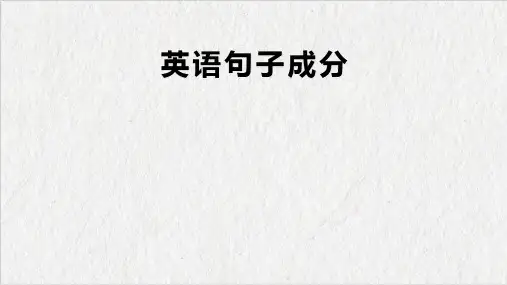

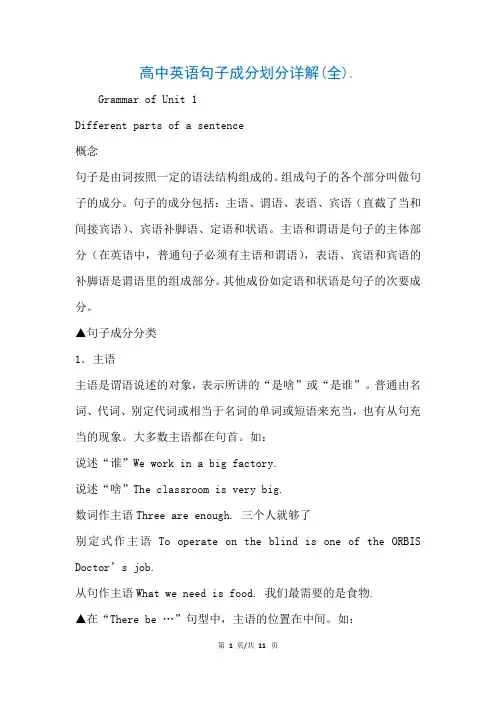
高中英语句子成分划分详解(全).Grammar of Unit 1Different parts of a sentence概念句子是由词按照一定的语法结构组成的。
组成句子的各个部分叫做句子的成分。
句子的成分包括:主语、谓语、表语、宾语(直截了当和间接宾语)、宾语补脚语、定语和状语。
主语和谓语是句子的主体部分(在英语中,普通句子必须有主语和谓语),表语、宾语和宾语的补脚语是谓语里的组成部分。
其他成份如定语和状语是句子的次要成分。
▲句子成分分类1.主语主语是谓语说述的对象,表示所讲的“是啥”或“是谁”。
普通由名词、代词、别定代词或相当于名词的单词或短语来充当,也有从句充当的现象。
大多数主语都在句首。
如:说述“谁”We work in a big factory.说述“啥”The classroom is very big.数词作主语Three are enough. 三个人就够了别定式作主语To operate on the blind is one of the ORBIS Doctor’s job.从句作主语What we need is food. 我们最需要的是食物.▲在“There be …”句型中,主语的位置在中间。
如:There are some bottles of milk in the box.▲在个不句型中,主语在整个句子后面,这时前面用it作形式主语。
如:It is very interesting to play the game called “treat or trick”.It took two workers about three months to build the house. 2.谓语谓语时用来讲明主语“做啥”、“是啥”或“如何样”,谓语必须是动词,谓语和主语在“人称”和“数”两方面必须一致。
如:He is very generous. She looks very smart and coolWe have finished the job. He can speak German.3.表语表语讲明主语“是啥”或“如何样”,由名词、形容词、介词、副词、别定式及相当于名词的词或短语来充当,它的位置在系动词后面。
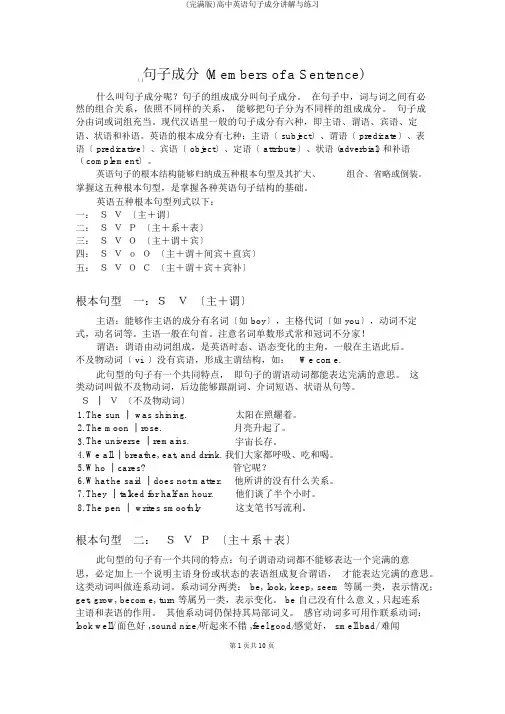
句子成分 (Members of a Sentence)什么叫句子成分呢?句子的组成成分叫句子成分。
在句子中,词与词之间有必然的组合关系,依照不同样的关系,能够把句子分为不同样的组成成分。
句子成分由词或词组充当。
现代汉语里一般的句子成分有六种,即主语、谓语、宾语、定语、状语和补语。
英语的根本成分有七种:主语〔 subject〕、谓语〔 predicate〕、表语〔 predicative〕、宾语〔 object〕、定语〔 attribute〕、状语 (adverbial) 和补语(complement〕。
英语句子的根本结构能够归纳成五种根本句型及其扩大、组合、省略或倒装。
掌握这五种根本句型,是掌握各种英语句子结构的基础。
英语五种根本句型列式以下:一:SV〔主+谓〕二:SVP〔主+系+表〕三:SVO〔主+谓+宾〕四:SVoO〔主+谓+间宾+直宾〕五:SVOC〔主+谓+宾+宾补〕根本句型一:SV〔主+谓〕主语:能够作主语的成分有名词〔如 boy〕,主格代词〔如 you〕,动词不定式,动名词等。
主语一般在句首。
注意名词单数形式常和冠词不分家!谓语:谓语由动词组成,是英语时态、语态变化的主角,一般在主语此后。
不及物动词〔 vi. 〕没有宾语,形成主谓结构,如:We come.此句型的句子有一个共同特点,即句子的谓语动词都能表达完满的意思。
这类动词叫做不及物动词,后边能够跟副词、介词短语、状语从句等。
S│ V〔不及物动词〕1.The sun │ was shining.太阳在照耀着。
2.The moon │rose.月亮升起了。
3.The universe │remains.宇宙长存。
4.We all │breathe, eat, and drink. 我们大家都呼吸、吃和喝。
5.Who │cares?管它呢?6.What he said │does not matter.他所讲的没有什么关系。
7.They │talked for half an hour.他们谈了半个小时。
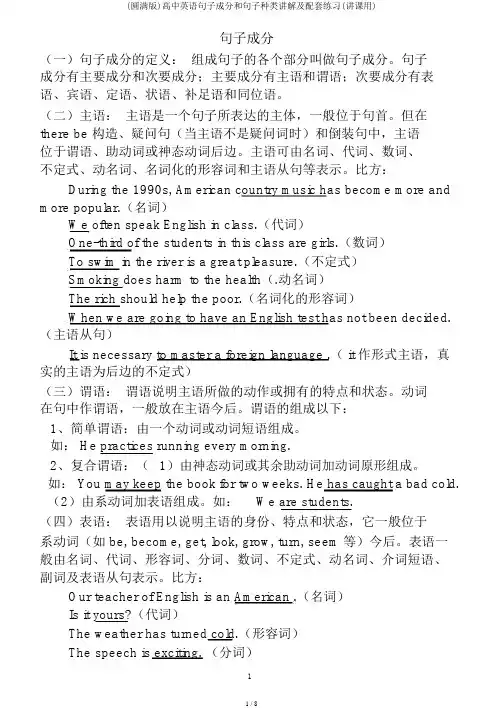
句子成分(一)句子成分的定义:组成句子的各个部分叫做句子成分。
句子成分有主要成分和次要成分;主要成分有主语和谓语;次要成分有表语、宾语、定语、状语、补足语和同位语。
(二)主语:主语是一个句子所表达的主体,一般位于句首。
但在there be 构造、疑问句(当主语不是疑问词时)和倒装句中,主语位于谓语、助动词或神态动词后边。
主语可由名词、代词、数词、不定式、动名词、名词化的形容词和主语从句等表示。
比方:During the 1990s, American country music has become more and more popular.(名词)We often speak English in class.(代词)One-third of the students in this class are girls.(数词)To swim in the river is a great pleasure.(不定式)Smoking does harm to the health(.动名词)The rich should help the poor.(名词化的形容词)When we are going to have an English test has not been decided. (主语从句)It is necessary to master a foreign language .( it 作形式主语,真实的主语为后边的不定式)(三)谓语:谓语说明主语所做的动作或拥有的特点和状态。
动词在句中作谓语,一般放在主语今后。
谓语的组成以下:1、简单谓语:由一个动词或动词短语组成。
如: He practices running every morning.2、复合谓语:(1)由神态动词或其余助动词加动词原形组成。
如: You may keep the book for two weeks. He has caught a bad cold.(2)由系动词加表语组成。
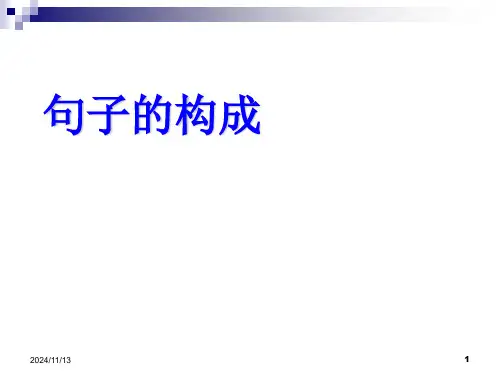
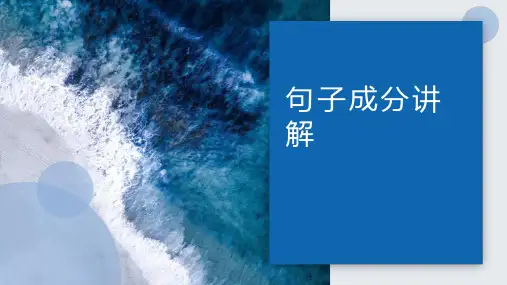
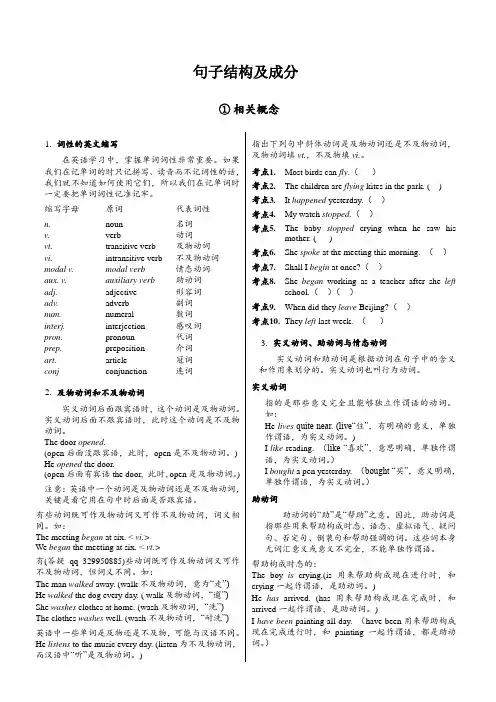
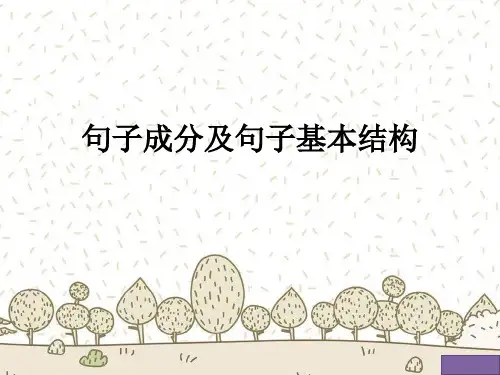
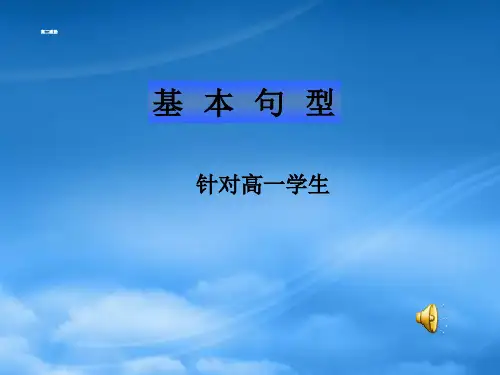
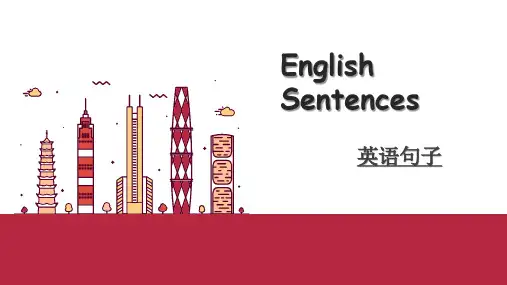
句子成分分析一、概述英语中,最简单的句子由主语、谓语构成,根据谓语动词性质,可以衍生出五种基本的句子。
其中谓语是句子中的心脏,不可或缺。
(一)主语的类型1.名词或名词短语充当主语The books are on the desk .John works hard.Gold is of great value .2.代词充当主语He always keeps his promiseIt is interesting to climb mountains3.不定式充当主语To study abroad is my greatest desire .To go to Japan for a visit is my plan for this year .4.动名词充当主语Seeing him makes me angry.Collecting stamps is one of his hobbies .Listening to music makes me happy.5.疑问词+不定式充当主语where to meet him is not decided yet.what to do is not decided.6.from+地点名词+to+地点名词充当主语From Beijing to Shanghai is about 1 000 kilometers.7.句子充当主语whether he can join us is a problem.That he doesn' t study makes me angry.Where he lives is still in doubt .(二)谓语由动词充当1.不及物动词2.系动词3.完全及物动词4.不完全及物动词5.授予动词二、由不同谓语类型所构成的五种基本句型(一)主语+系动词+表语(主语补足语)1.be动词,be动词后面的表语有十一种;He is a student.The girl is so cute.My dream is to be a teacher.My job is teaching English.The chair is yours.Kate was here yesterday.She is in the room.The books are on the desk .The problem is whether he can join us .The question is When to set out .My hobby is collecting stamps .The story is interesting .I am interested in the story.The book is of great value.The machine is of no use.2.become,接名词或是形容词作表语;She became a teacher two years ago.He became angry.You will become a good student if you study hard .She is becoming more and more charming.3.turn,通常只接与颜色或心情有关的形容词作表语;The leaves turns green.Her face turned red.The leaves were turning yellow.His face turned red with anger when he saw Mary.4.get,通常接表示生气或激动的形容词作表语;He got mad.Please don’t get angry。
句子成分精讲一、句子成分:主语、谓语、宾语、表语、定语、状语、补语等。
主要成分:主语和谓语1、主语一个句子中需要加以说明或描述的对象。
主语的位置:一般位于句首,由名词、代词、数词或相当于名词的词、短语等充当。
The school is far from here. 名词做主语She goes to school by bike.代词做主语Eight is a lucky number.数词做主语The blind need more help.名词化的形容词做主语There is a pen on the desk. 名词做主语Predicting the future is interesting.动名词做主语To be a doctor is my dream.不定式短语做主语2、谓语表示人或事物(主语)的动作和存在的状态.英语中由动词be、动词have和行为动词来充当谓语动词句子的时态和语态是通过谓语表现出来。
谓语动词往往由一个或一个以上的助动词或情态动词加上主要动词构成。
分析句子的主语和谓语Mr. Li teaches English.He can play the piano.My parents and I are having dinner.3、表语用来说明主语的身份、特征、性质、状态。
表语的位置用在动词be和系动词的后面。
名词、代词、数词、介词短语、副词等都可以和连系动词一起构成复合谓语。
Your pen is on the desk.He got very angry.My dream is to have a robot.常见的系动词1. be动词2. 与感觉有关的动词 look, sound, smell, taste, feel 等3. 表示状态变化的动词,意为“变得” “变成” 如 get, grow, turn等上述两类词作连系动词时要用形容词作表语,千万不能用副词。
句子结构分析句子成分:主语、谓语、宾语、表语、定语、状语、补语等。
主要成分:主语和谓语1、主语一个句子中需要加以说明或描述的对象。
主语的位置:一般位于句首,由名词、代词、数词或相当于名词的词、短语等充当。
The school is far from here。
名词做主语She goes to school by bike。
代词做主语Eight is a lucky number. 数词做主语The blind need more help。
名词化的形容词做主语There is a pen on the desk. 名词做主语Predicting the future is interesting. 动名词做主语To be a doctor is my dream. 不定式短语做主语若不定式短语作主语常用it作形式主语,而把真正的主语(不定式短语)放在句后。
It takes me an hour to get there.2、谓语表示人或事物(主语)的动作和存在的状态。
英语中由动词be、动词have和行为动词来充当谓语动词句子的时态和语态是通过谓语表现出来。
谓语动词往往由一个或一个以上的助动词或情态动词加上主要动词构成。
分析下列句子的主语和谓语Mr。
Li teaches English.He can play the piano。
My parents and I are having dinner。
He studies very hard。
She likes speaking。
I can swim in the river.We don’t like math。
He doesn’t watch TV.3、表语用来说明主语的身份、特征、性质、状态。
一般由名词或者形容词担任。
表语的位置:用在动词be和系动词的后面。
凡是系动词(be 动词,感官动词等)出现的地方,后面必定带着表语名词、代词、数词、介词短语、副词等都可以和连系动词一起构成复合谓语。
句子成分(一)句子成分的定义:构成句子的各个部分叫做句子成分。
句子成分有主要成分和次要成分;主要成分有主语和谓语;次要成分有表语、宾语、定语、状语、补足语和同位语。
(二)主语:主语是一个句子所叙述的主体,一般位于句首。
但在there be结构、疑问句(当主语不是疑问词时)和倒装句中,主语位于谓语、助动词或情态动词后面。
主语可由名词、代词、数词、不定式、动名词、名词化的形容词和主语从句等表示。
例如:During the 1990s, American country music has become more and more popular.(名词)We often speak English in class.(代词)One-third of the students in this class are girls.(数词)To swim in the river is a great pleasure.(不定式)Smoking does harm to the health.(动名词)The rich should help the poor.(名词化的形容词)When we are going to have an English test has not been decided.(主语从句)It is necessary to master a foreign language.(it作形式主语,真正的主语为后面的不定式)(三)谓语:谓语说明主语所做的动作或具有的特征和状态。
动词在句中作谓语,一般放在主语之后。
谓语的构成如下:1、简单谓语:由一个动词或动词短语构成。
如:He practices running every morning.2、复合谓语:(1)由情态动词或其他助动词加动词原形构成。
如:You may keep the book for two weeks. He has caught a bad cold. (2)由系动词加表语构成。
如:We are students.(四)表语:表语用以说明主语的身份、特征和状态,它一般位于系动词(如be, become, get, look, grow, turn, seem等)之后。
表语一般由名词、代词、形容词、分词、数词、不定式、动名词、介词短语、副词及表语从句表示。
例如:Our teacher of English is an American.(名词)Is it yours?(代词)The weather has turned cold.(形容词)The speech is exciting.(分词)Three times seven is twenty one?(数词)His job is to teach English.(不定式)His hobby(爱好)is playing football.(动名词)The machine must be out of order.(介词短语)Time is up. The class is over.(副词)The truth is that he has never been abroad.(表语从句)(五)宾语:宾语表示动作的对象或承受者,一般位于及物动词和介词后面。
例如:They went to see an exhibition(展览)yesterday.(名词)The heavy rain prevented me from coming to school on time.(代词)How many dictionaries do you have? I have five.(数词)They helped the old with their housework yesterday.(名词化形容词)He pretended not to see me.(不定式短语)I enjoy listening to popular music.(动名词短语)I think(that)he is fit for his office.(宾语从句)宾语种类:(1)双宾语(间接宾语+直接宾语).例如:Lend me your dictionary, please.(2)复合宾语(宾语+宾补).例如:They elected him their monitor.(六)宾语补足语:英语中有些及物动词,除有一个直接宾语以外,还要有一个宾语补足语,才能使句子的意义完整。
带有宾语补足语的一般句型为:某些及物动词(如make等+宾语+宾补)。
宾补可由名词、形容词、副词、不定式、分词、介词短语和从句充当。
例如:His father named him Dongming.(名词)They painted their boat white.(形容词)Let the fresh air in.(副词)You mustn’t force him to lend his money to you.(不定式短语)We saw her entering the room.(现在分词)We found everything in the lab in good order.(介词短语)We will soon make our city what your city is now.(从句)(七)定语:修饰名词或代词的词、短语或从句称为定语。
定语可由以下等成分表示:Guilin is a beautiful city.(形容词)China is a developing country; America is a developed country.(分词) There are thirty women teachers is our school.(名词)His rapid progress in English made us surprised.(代词)Our monitor is always the first to enter the classroom.(不定式短语) The teaching plan for next term has been worked out.(动名词)He is reading an article about how to learn English.(介词短语)(八)状语:修饰动词、形容词、副词或整个句子,说明动作或状态特征的句子成分,叫做状语。
可由以下形式表示:Light travels most quickly.(副词及副词性词组)He has lived in the city for ten years.(介词短语)He is proud to have passed the national college entrance examination.(不定式短语)He is in the room making a model plane.(分词短语)Wait a minute.(名词)Once you begin, you must continue.(状语从句)状语种类如下:How about meeting again at six?(时间状语)Last night she didn’t go to the dance party because of the rain.(原因状语)I shall go there if it doesn’t rain.(条件状语)Mr Smith lives on the third floor.(地点状语)She put the eggs into the basket with great care.(方式状语)She came in with a dictionary in her hand.(伴随状语)In order to catch up with the others, I must work harder.(目的状语) He was so tired that he fell asleep immediately.(结果状语)She works very hard though she is old.(让步状语)I am taller than he is.(比较状语)简单句、并列句和复合句(一)句子种类两种分类法1、按句子的用途可分四种:1)陈述句(肯定、否定):He is six years old; She didn’t hear of you before.2)疑问句(一般、特殊、选择、反意):Do they like skating? How old is he? Is he six or seven years old? Mary can swim, can’t she?3)祈使句:Be careful, boys; Don’t talk in class4)感叹句:How clever the boy is!2、按句子的结构可分三种:1)简单句:只有一个主语(或并列主语)和一个谓语(或并列谓语)。
例如:l. He often reads English in the morning.Tom and Mike are American boys.She likes drawing and often draws pictures for the wall newspapers.2) 并列句:由并列连词(and, but, or等)或分号(;)把两个或两个以上的简单句连在一起构成。
例如:You help him and he helps you. The future is bright; the road is tortuous. 前途是光明的,道路是曲折的。
3)复合句:含有一个或一个以上从句的句子。
复合句包含:名词性从句(主语从句、宾语从句、表语从句和同位语从句)、定语从句和状语从句等。
例如:The foreign visitors took a lot of pictures when they were at the Great Wall.(二)简单句的五种基本句型1、主语+系动词+表语:e. g. He is a student.2、主语+不及物动词:e. g. We work.3、主语+及物动词+宾语:e. g. Henry bought a dictionary.4、主语+及物动词+双宾语(间接宾语+直接宾语):e. g. My father bought me a car.5、主语+及物动词+复合宾语(宾语+宾补):e. g. Tom made the baby laugh.注:其他各种句子都可由这一种基本句型扩展、变化或省略而构成。